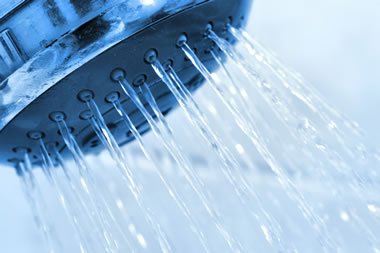Dirty Shower Heads Could Be Deadly!
 There is nothing quite like a steaming-hot shower to perk you up in the morning or to leave you feeling refreshed last thing at night. But if you thought your shower was a clean and safe haven of tranquillity, think again. Chances are, it could be a breeding ground for deadly bacteria and you may not even realise it.
There is nothing quite like a steaming-hot shower to perk you up in the morning or to leave you feeling refreshed last thing at night. But if you thought your shower was a clean and safe haven of tranquillity, think again. Chances are, it could be a breeding ground for deadly bacteria and you may not even realise it.
Experts at Manchester University have conducted studies into the condition of the inside of showers – and it doesn’t make for pleasant reading.
Water coming from these shower heads could potentially harbour more bacteria than you’d find in the average toilet.
A version of this story dealing with the dangers from dirty shower heads first appeared in Legionella Control International’s newsletter. To get it in your inbox, sign up for free here.
Examples of bacteria that could be found in your shower head
Among the bacteria and fungi found in the showers that were tested were:
- Legionella bacteria (can cause Legionnaires’ disease and Pontiac fever)
- Pseudomonas aeruginosa (can trigger ear and eye infections)
- Mycobacterium avium subspecies paratuberculosis (linked to digestive conditions including Crohn’s disease)
- Malassezia fungi (linked to eye conditions)
- Malassezia restricta (linked to scalp infections)
- Acanthamoeba (also linked to eye infections)
What can you do to limit the chance of encountering these bacteria and fungi while showering?
It is suggested that you loosely tie a plastic bag around the shower head so as to limit the creation of a spray or aerosol, lie the head flat on the base of the shower or bath, then turn on the shower and run water through it for a few minutes before using it.
This can help to flush out anything that might be lurking in the shower head and on the inside of the pipes.
Legionella bacteria will multiply in temperatures between 20 and 45 degrees Celsius
It’s best to clean your shower regularly
Additionally, you should clean your shower and shower head regularly.
This doesn’t just mean the parts you can see… it also means dismantling your shower head and cleaning it both inside and out with a recognised product to help combat any scale, debris or bacteria that may be lurking unseen inside the shower system itself.
What to do if you’ve been away
Before use, carefully flushing the shower through with hot water can also help.
Bacteria such as legionella will multiply in temperatures between 20 and 45 degrees Celsius, but is killed once the temperature goes above 60 degrees Celsius.
Furthermore, if you have been away on holiday, run your shower for a few minutes before using it.
This will help to get rid of any build-up of bacteria that may have developed while you were away.
Underlying health conditions may mean you are more susceptible
Few people would expect an innocent shower would pose such a risk to the health of those using it.
While infection rates tend to be low, it makes sense to keep your shower nice and clean – particularly if you have recently been ill, or are more prone to infection for some reason.
For example, if you have a lung or skin condition, it may potentially be made worse if you encounter a water source that is not as clean as it should be.
It’s also worth remembering that for certain people, especially those receiving treatment in hospitals, infection can sometimes be much more serious, and even life-threatening.
As you can see, keeping your shower clean could mean the difference between good health and bad… don’t get caught out.
Expert legionella and water safety solutions
Legionella Control International is a world-leading legionella and water safety specialist. Our teams of experts support business owners, landlords and those responsible for the control of waterborne pathogens including Legionella bacteria in the workplace, helping them to protect their staff, tenants and others and so meet their health and safety obligations in this specialist area.
We deliver a range of specialist risk management solutions including water quality analysis and legionella sampling, risk assessment, regulatory compliance auditing, training, expert witness support and other services that help keep people safe.


